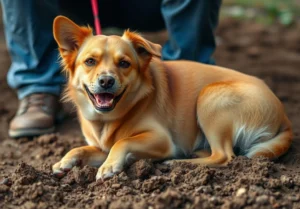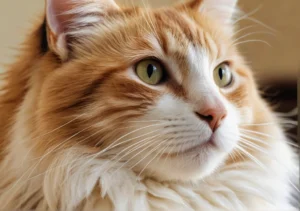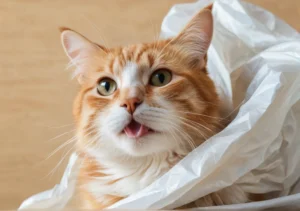Cats are known for their quirky behavior, but have you ever wondered why some cats eat mud? Let’s explore the reasons behind this unusual habit.
Have you ever caught your cat snacking on mud in the garden and wondered what could possibly be the reason behind this strange behavior? There are a few reasons why some cats eat mud, ranging from nutritional deficiencies to natural instincts.
Nutritional Deficiencies
When cats start eating mud, it could be a sign of nutritional deficiencies in their diet. Just like us, cats need a balanced diet to stay healthy. If they are lacking essential nutrients such as iron or minerals, they may resort to eating mud to fulfill their nutritional needs. Ensuring your cat is receiving a complete and balanced diet can help prevent them from seeking out unconventional food sources like mud.
In addition , certain digestive issues may impact nutrient absorption in cats, leading them to feel compelled to eat mud. It’s essential to consult your vet if you notice your cat engaging in this behavior, as it could indicate an underlying health issue that needs to be addressed promptly.
Natural Instincts
Cats have unique natural instincts that drive their behavior, including eating mud. One of these instincts is the hunt and prey drive, which can lead cats to explore and taste different substances, including mud. Additionally, cats have a propensity for exploring their environment, often using their mouths to investigate new textures and tastes.
Sometimes , cats may also consume mud as a way to regulate their digestive system, acting as a natural detoxifier. However, it’s crucial to monitor this behavior closely and ensure it doesn’t escalate into a health concern.
Remember , cats are curious creatures with complex behaviors, and understanding their natural instincts can help decipher why they might engage in eating mud. By providing adequate stimulation and meeting their nutritional needs, you can support your cat in making healthy choices.
Pica Behavior
If you’ve noticed your cat munching on mud, pica behavior might be the culprit. Pica is a condition where animals, including cats, develop a habit of eating non-food items. This behavior can stem from various reasons, such as nutritional deficiencies, boredom, or even underlying health issues. When it comes to cats eating mud, pica behavior could be the driving force behind this unusual habit. If your feline friend is displaying this behavior, it’s essential to consult with a veterinarian to rule out any underlying health concerns and determine the best course of action to address this behavior.
Seeking Minerals
Cats are known for their curious dietary habits, and eating mud to fulfill their mineral requirements is not uncommon. If a cat’s regular diet is lacking in essential nutrients such as minerals, they may instinctively seek out alternative sources to meet their nutritional needs. Consuming mud, which may contain trace minerals like magnesium or iron, could be your cat’s way of supplementing its diet. However, it’s crucial to ensure that your cat has access to a balanced and nutritious diet to prevent them from resorting to eating non-food items like mud. Providing high-quality cat food and consulting with a veterinarian about potential mineral deficiencies can help address this behavior effectively.
Additional Insight:
Other than mud, cats may also eat grass, plants, or even plastic to fulfill their mineral requirements or aid in digestion. While occasional consumption of non-food items may not be harmful, excessive or persistent behavior should prompt a visit to the vet to rule out any underlying health issues.
Environmental Factors
Living outdoors can expose cats to various substances in their environment, leading to unusual behaviors like eating mud. Cats may ingest mud due to a lack of proper nutrition or seeking minerals found in the soil. Additionally, boredom or curiosity may drive cats to explore and taste different textures, including mud. If your cat is eating mud, consider providing them with a stimulating indoor environment, ensuring they have appropriate toys and activities to keep them engaged and satisfied. Furthermore, minimizing their access to areas with mud or potentially harmful substances can help prevent this behavior.
Health Concerns
The habit of eating mud can pose health risks for cats, as soil may contain toxins, harmful chemicals, or parasites that can lead to gastrointestinal issues or poisoning. To safeguard your cat’s well-being, ensure they have a balanced diet rich in essential nutrients to prevent nutritional deficiencies that may drive them to eat inappropriate substances. Regularly deworming your cat and keeping them away from contaminated areas can help reduce the risk of ingesting harmful parasites through mud. If you notice your cat consuming mud frequently, consult with your veterinarian to rule out any underlying health issues and receive guidance on proper management. Additionally, providing a safe and enriching environment indoors can deter your cat from seeking out unconventional items like mud.
Additional Unique Insight:
- Supervised Outdoor Time: If your cat enjoys outdoor activities, consider supervising their time outside to prevent them from ingesting harmful substances like mud. By monitoring their outdoor adventures, you can ensure they stay safe and avoid potential health hazards.
Remember, a cat eating mud may indicate underlying issues that need to be addressed promptly to maintain their well-being and safety. By understanding the environmental factors and health concerns associated with this behavior, you can take proactive steps to prevent any adverse effects on your feline companion.
Curb the Behavior
If your cat has developed a habit of eating mud, it’s essential to find ways to discourage this behavior and redirect their attention to more appropriate activities. One effective strategy is to create a designated indoor or outdoor play area for your cat with engaging toys and scratching posts. By providing stimulating alternatives, you can help prevent your cat from seeking out potentially harmful substances like mud. Additionally, you can try using deterrent sprays or covers to keep your cat away from areas where they may be tempted to eat mud. Consistency is key when trying to curb this behavior, so be patient and persistent in guiding your cat towards better habits.
Fun Cat Facts
Did you know that cats have a unique sensory organ called the Jacobson’s organ, located on the roof of their mouth? This organ allows cats to analyze scents in a way that humans can’t, giving them a heightened sense of smell. Cats are also incredible jumpers, capable of leaping up to six times their body length in a single bound! Another fascinating fact about cats is that they have a specialized grooming technique where they use their rough tongues to clean themselves, removing loose fur and keeping their coats healthy. These fun facts offer a glimpse into the intriguing behaviors and abilities of our feline friends, enriching our understanding of these mysterious creatures.
Additional Unique Insight: While eating mud may seem like a strange behavior for cats, it can sometimes be a sign of underlying health issues such as nutrient deficiencies or gastrointestinal problems. If your cat continues to eat mud despite your best efforts to discourage it, it’s important to consult with your veterinarian to rule out any potential medical causes. Monitoring your cat’s behavior and providing proper nutrition are crucial steps in ensuring their overall well-being.
Remember, every cat is unique, so understanding their individual needs and behaviors is key to providing them with the best care possible. By staying informed and proactive, you can help your cat lead a happy and healthy life.
Alex, a passionate animal lover, has experience in training and understanding animal behavior. As a proud pet parent to two dogs and three cats, he founded AnimalReport.net to share insights from animal experts and expand his knowledge of the animal kingdom.




